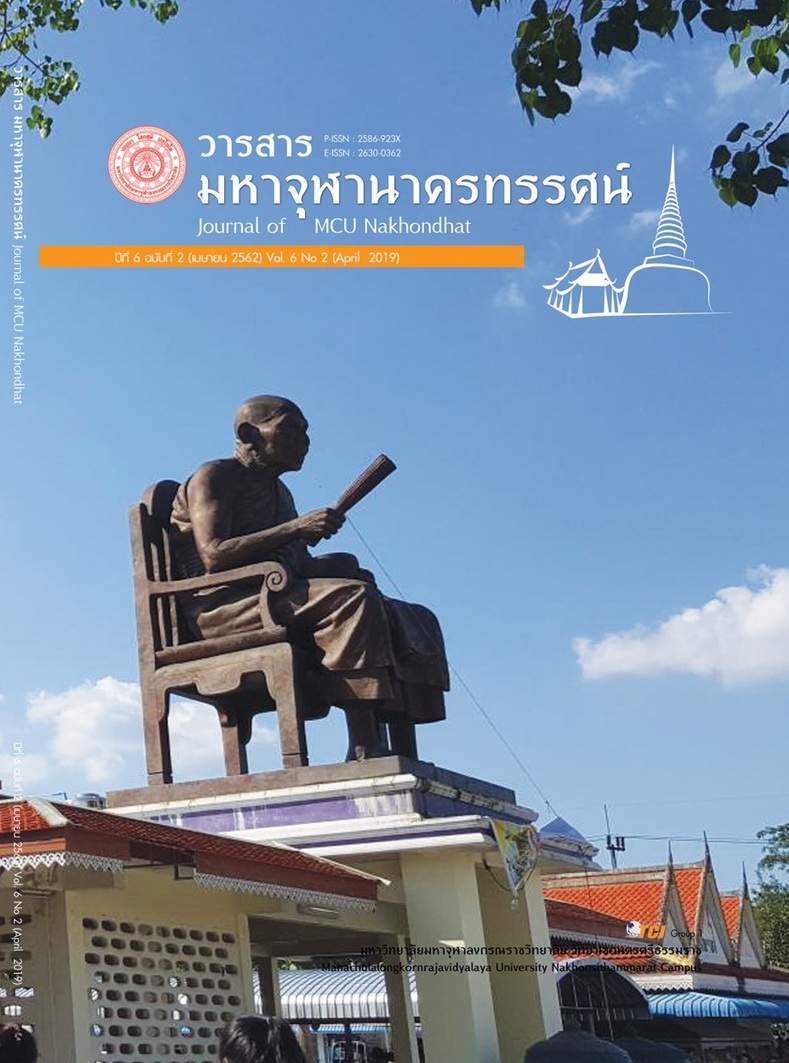ATTRIBUTION STUDY AND ORGANIZATION CULTURAL DIMENSION TOWARDS KNOWLEDGE-BASED SOCIETY.
Main Article Content
Abstract
This study aimed to investigate attribution and cultural dimension of organization, in order to reveal the adaptive capacity towards knowledge-based society. This Quantitative research approach by questionnaire contributed to group of 378 personnel within Rajabhat University; Rattanakosin Group got 312 personnel back. The analysis was presented in descriptive manner.
As results, it revealed current event and condition or desirable adaptation direction which organization should applied as guideline for development of attribution and culture dimension towards learning. This guideline will provide potential adaptive capacity towards knowledge-based society. As comment on questionnaires, understandable and acceptable of personnel and administrators in organization culture adaptation is challenge, as well as, contributed motivation and changed in management values to increase operating capacity and efficiency of personnel and organization. Administrator should understand objective and adaptation direction, also environment factors for effective management and determination of adaptive strategy for organization.
Article Details
References
ทิพย์ ขันแก้ว และคณะ. (2560). กระบวนเสริมสร้างพฤติกรรมความรับผิดชอบตอองค์กรตามหลักพุทธจิตวิทยาของบุคลากร มหาวิทยาลัยมหาจุฬาลงกรณราชวิทยาลัยในภาคตะวันออกเฉียงเหนือ. วารสารสันติศึกษาปริทรรศน์ มจร, 5(2), 190-201.
พระครูปริยัติรัตนานุยุต. (2560). พุทธธรรมกับการลดความเหลื่อมล้ำในสังคมไทย. วารสาร มจร พุทธปัญญาปริทรรศน์, 2(1), 49-60.
พระครูวิจิตรสาธุรส. (2560). การใช้หลักพรหมวิหารธรรมในการบริหารงานของผู้บริหารสถานศึกษาตามทัศนะของครูกลุ่มโรงเรียนการกุศล จังหวัดสงขลา. วารสารมหาจุฬานาครทรรศน์, 4(1), 1-15.
พระครูสนทรเขมาภินันท์. (2560). พุทธปณิธาน : โครงการปณิธานสู่ความดี. วารสาร มจร พุทธปัญญาปริทรรศน์, 2(3), 43-56.
อารีย์ อัศวนุภาพ และคณะ. (2560). ปัจจัยพหุระดับที่ส่งผลต่อประสิทธิผลทางการศึกษาของสถานศึกษาสังกัดสํานักงานคณะกรรมการการอาชีวศึกษา เขตกรุงเทพมหานคร. วารสารสันติศึกษาปริทรรศน์ มจร, 5(2), 190-201.
Beckhard, R. (1969). Organization Development: Strategies and Models. Reading, Mass: Addison-Wesley Publishing Co., Inc.,.
Daulatram B. L. (2003). Organizational culture and job satisfaction. Journal of Business & Industrial Marketing, 18(3), 219 – 236.
Lo, T. Y. (2002). Quality culture: a product of motivation within organization. Managerial Auditing Journal, 17(5), 272-276.
Mayo, E. (1963). The human problems of an industrial civilization. New York: Viking Press.
McGill, M. E. (1977). Organization development for operating managers. New York: AMACOM.
OECD. (2008). 21st Century Learning: Research, Innovation and Policy Directions from recent OECD analyses. OECD: Paris.
Pellegrino, J.W., & Hilton, M. (Eds.). (2012). Education for life and work: Developing transferable knowledge and skills in the 21st century. เรียกใช้เมื่อ 1 February 2019 จาก Washington, DC: National Academies Press: https://www.nap.edu/catalog/13398/ education-for-life-and-work-developingtransferable-knowledge-and-skills
Randy, G. P. (2003). Change performance to change the culture. Industrial and Commercial Training, 35(6), 251-255.
Trilling, B. and Fadel, C. (2009). 21st Century Skills Learning for Life in Our times. CA: Jossey-Bass, 2009. Print.
UNEP. (2011). Towards a Green Economy: Pathways to Sustainable Development and Poverty Eradication. เรียกใช้เมื่อ 1 February 2019 จาก https://web.unep.org/ greeneconomy/sites/unep.org.greeneconomy/files/field/image/green_economyreport_final_dec2011.pdf
Wiley C.,. (1997). What motivates employees according to over 40 years of motivation surveys. International Journal of Manpower, 18(3), 263.
World Trade Organization. (2011). Harnessing trade for sustainable development and a green economy. เรียกใช้เมื่อ 1 February 2019 จาก https://www.wto.org/english/res_e/publications_e/brochure_ rio_ 20_e.pdf


